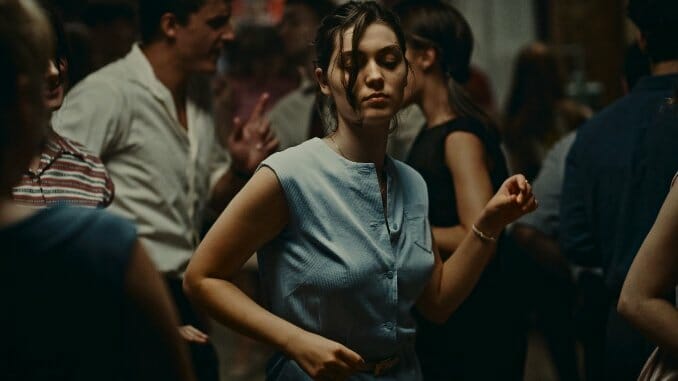The Anxious Prescience of Happening

For many, the leaked U.S. Supreme Court opinion that foretells the end of Roe v. Wade is a life-shattering revelation. However, for those living in states where abortion access has been gradually limited, this proposed rescinding of the 1973 landmark Supreme Court decision has seemed all but inevitable. Heartbeat bills, enforced parental consent, insurance restrictions and mandatory waiting periods have already been enforced in most “red” states. If Roe is indeed overturned, nearly 20 of these same states would almost certainly (and immediately) ban abortion outright. Though several American films have already chronicled the difficulty and stigma that surrounds legal abortion access—including Palindromes, Obvious Child, If These Walls Could Talk, Citizen Ruth, The Abortion Diaries, Never Rarely Sometimes Always—Audrey Diwan’s ‘60s-set French abortion drama Happening feels terribly, eerily prescient on the heels of this tragic setback. Racked with emotional tension and visceral turmoil, it paints a painful portrait of how women have suffered—and will, sadly, continue to suffer—for the ability to make their own precious choices.
Based on the 2000 novel/memoir hybrid of the same name by Annie Ernaux, Happening is a claustrophobic recount of one woman’s dogged quest for an illegal abortion in order to pursue her academic studies. Taking place in 1963’s post-war France, the practice was heavily criminalized—meaning that Anne (Anamaria Vartolomei) risks up to 20 years in prison if she’s caught by authorities. As such, she’s discrete yet determined in her search for a provider. She visits an OBGYN, puts feelers out on campus and even resorts to unsafe, intrusive amateur procedures. Unfortunately, nothing seems successfully induce miscarriage. As her desperation mounts and options begin to fade, the audience is given consistent reminders of just how much time has passed. The burdensome news is first broken to Anne by her physician when she’s three weeks pregnant. The weeks continue to pass; the burgeoning life within her fails to dim with each attempted abortion. The stress of this unwanted pregnancy begins to affect Anne’s previously rich personal life. Her academic performance suffers terribly, she grows distant from her working class family, and she finds herself ostracized by her friends for her supposedly “loose” tendencies. As time slips by without procuring an abortion, so do the best facets of Anne’s life pre-pregnancy.
Vartolomei’s performance is rousing, managing to evoke the gnawing sensation of prolonged anxiety through a permanent pursed lip and furrowed brow. While her actions are initially subtle so as not to reveal the truth behind her turmoil, her demeanor begins to crack over time, revealing a hostility toward those around her that can’t—or flat-out won’t—help her plight. However, she also encounters a solidarity of sisterhood that sustains her through the ordeal. These connections are ultimately fleeting—merely relaying information or performing clandestine services—yet they provide more comfort and aid to Anne than any of her previously established relationships. Their mutual understanding of the frenzied panic and looming threat of social ostracization makes for a seamless camaraderie—even if the threat of imprisonment means that these relations must remain untraceable and impermanent.
-

-

-

-

-

-

-

-

-

-

-

-

-

-

-

-

-

-

-

-

-

-

-

-

-

-

-

-

-

-

-

-

-

-

-

-

-

-

-

-








































